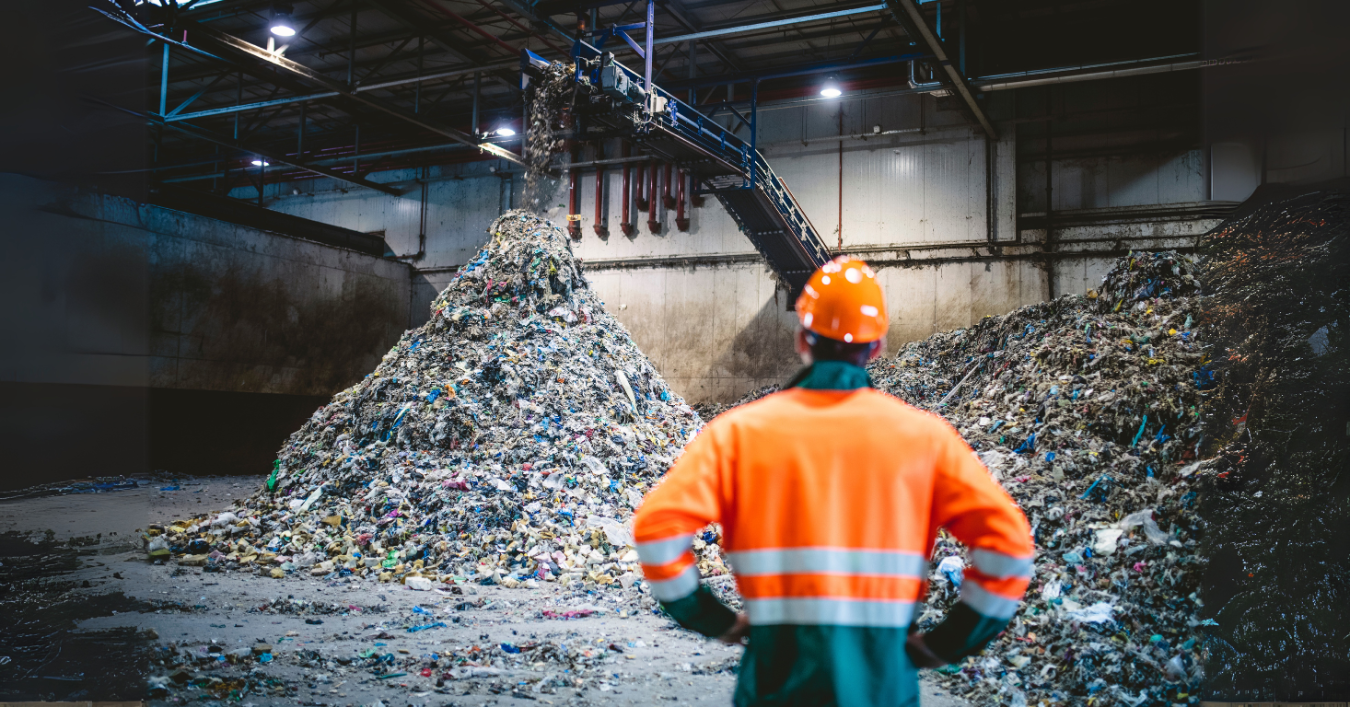
Level 2 Award in Solid and Hazardous Waste Management
- Gain an understanding of the types and characteristics of solid and hazardous waste and their impacts on human health and the environment.
- Learn about waste minimization, recycling, and safe disposal techniques.
- Understand the legal and regulatory frameworks governing the handling and disposal of solid and hazardous waste.
- Prepare for a career in waste management, environmental compliance, or sustainability within industries, municipalities, or regulatory agencies.
- Understand the classification and characteristics of solid and hazardous waste.
- Be familiar with the regulatory requirements for managing hazardous and non-hazardous waste.
- Learn how to implement waste minimization strategies and the principles of recycling and reuse.
- Gain practical knowledge of waste management technologies, including collection, treatment, and disposal methods.
- Understand the safety protocols for handling hazardous waste and the environmental impacts of poor waste management practices.
- Introduction to Solid and Hazardous Waste
- Overview of solid and hazardous waste types, sources, and characteristics.
- The environmental and health risks associated with improper waste management.
- Classification and Identification of Hazardous Waste
- Criteria for classifying waste as hazardous, including chemical properties, toxicity, and environmental persistence.
- Common examples of hazardous waste materials, including chemicals, heavy metals, and medical waste.
- Waste Minimization and Recycling Strategies
- Study of waste reduction techniques, including source reduction, reusing materials, and recycling processes.
- The benefits of waste minimization on both the environment and business operations.
- Waste Collection, Transportation, and Segregation
- Methods for collecting, segregating, and transporting solid and hazardous waste safely and efficiently.
- Overview of the equipment and tools used in waste handling and transportation.
- Waste Treatment and Disposal Methods
- Introduction to various treatment methods, such as incineration, landfilling, composting, and stabilization for hazardous materials.
- Best practices for the disposal of non-hazardous and hazardous waste to reduce environmental impact.
- Regulatory and Legal Frameworks for Waste Management
- Study of national and international regulations related to waste management, including the Hazardous Waste Management Act and Environmental Protection Laws.
- Overview of waste tracking and documentation requirements for compliance.
- Health and Safety in Waste Management
- Safe handling practices for hazardous materials, including protective equipment and emergency response procedures.
- Understanding the potential health risks associated with exposure to hazardous waste and the steps to mitigate them.
- Progress to further studies in environmental science, hazardous materials management, or sustainable waste management.
- Take on roles such as hazardous waste manager, waste management consultant, environmental compliance officer, or sustainability coordinator.
- Work in government agencies, private environmental firms, or industrial sectors that require waste management solutions.
- Foundational Knowledge: This course equips learners with the critical knowledge needed to understand and manage both solid and hazardous waste in a safe, compliant, and environmentally responsible manner.
- Practical Application: Learn through real-world case studies and practical examples of hazardous waste management in various industries.
- Expert Instructors: Study with instructors who have significant experience in environmental management and waste handling, providing you with valuable industry insights.
- Globally Recognized Certification: Gain a certification that is respected by employers in the environmental and waste management industries, boosting career opportunities.
Study Units
- Introduction to Solid and Hazardous Waste
- Overview of solid and hazardous waste types, sources, and characteristics.
- The environmental and health risks associated with improper waste management.
- Classification and Identification of Hazardous Waste
- Criteria for classifying waste as hazardous, including chemical properties, toxicity, and environmental persistence.
- Common examples of hazardous waste materials, including chemicals, heavy metals, and medical waste.
- Waste Minimization and Recycling Strategies
- Study of waste reduction techniques, including source reduction, reusing materials, and recycling processes.
- The benefits of waste minimization on both the environment and business operations.
- Waste Collection, Transportation, and Segregation
- Methods for collecting, segregating, and transporting solid and hazardous waste safely and efficiently.
- Overview of the equipment and tools used in waste handling and transportation.
- Waste Treatment and Disposal Methods
- Introduction to various treatment methods, such as incineration, landfilling, composting, and stabilization for hazardous materials.
- Best practices for the disposal of non-hazardous and hazardous waste to reduce environmental impact.
- Regulatory and Legal Frameworks for Waste Management
- Study of national and international regulations related to waste management, including the Hazardous Waste Management Act and Environmental Protection Laws.
- Overview of waste tracking and documentation requirements for compliance.
- Health and Safety in Waste Management
- Safe handling practices for hazardous materials, including protective equipment and emergency response procedures.
- Understanding the potential health risks associated with exposure to hazardous waste and the steps to mitigate them.
Upon completing this award, learners will:
- Understand the classification and characteristics of solid and hazardous waste.
- Be familiar with the regulatory requirements for managing hazardous and non-hazardous waste.
- Learn how to implement waste minimization strategies and the principles of recycling and reuse.
- Gain practical knowledge of waste management technologies, including collection, treatment, and disposal methods.
- Understand the safety protocols for handling hazardous waste and the environmental impacts of poor waste management practices.
This course is ideal for individuals seeking to build a strong foundation in solid and hazardous waste management. It is particularly suited to:
Aspiring Environmental and Waste Management Professionals
Those who wish to begin a career in the field of waste management, environmental protection, or sustainability.Industrial and Manufacturing Personnel
Employees in sectors where waste generation and hazardous material handling are part of daily operations.Health, Safety, and Environment (HSE) Officers
Safety professionals responsible for ensuring safe waste management practices within organizations.Municipal and Government Employees
Individuals working in public health, sanitation, or environmental compliance roles within city or local authorities.Environmental Consultants and Auditors
Professionals involved in environmental assessments, waste audits, or advising on compliance with waste-related regulations.Students of Environmental or Chemical Sciences
Learners pursuing environmental or scientific studies who want practical knowledge in waste classification and management techniques.Recycling and Waste Management Service Providers
Staff from private or public waste handling services aiming to enhance their knowledge and comply with environmental standards.Compliance and Regulatory Officers
Individuals ensuring that organizations adhere to national and international waste handling and environmental protection laws.
Our assessment process is designed to ensure every learner achieves the required level of knowledge, skills, and understanding outlined in each course unit.
Purpose of Assessment
Assessment helps measure how well a learner has met the learning outcomes. It ensures consistency, quality, and fairness across all learners.
What Learners Need to Do
Learners must provide clear evidence that shows they have met all the learning outcomes and assessment criteria for each unit. This evidence can take different forms depending on the course and type of learning.
Types of Acceptable Evidence
Assignments, reports, or projects
Worksheets or written tasks
Portfolios of practical work
Answers to oral or written questions
Test or exam papers
Understanding the Structure
Learning outcomes explain what learners should know, understand, or be able to do.
Assessment criteria set the standard learners must meet to achieve each learning outcome.
Assessment Guidelines
All assessment must be authentic, current, and relevant to the unit.
Evidence must match each assessment criterion clearly.
Plagiarism or copied work is not accepted.
All learners must complete assessments within the given timelines.
Where applicable, assessments may be reviewed or verified by internal or external quality assurers.
Full learning outcomes and assessment criteria for each qualification are available from page 8 of the course handbook.
Top Courses
No results found.
Related Courses
Let's Get in touch
Deleting Course Review
Course Access
This course is password protected. To access it please enter your password below:



